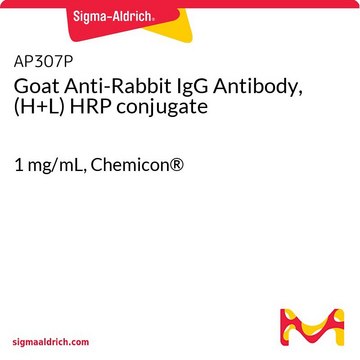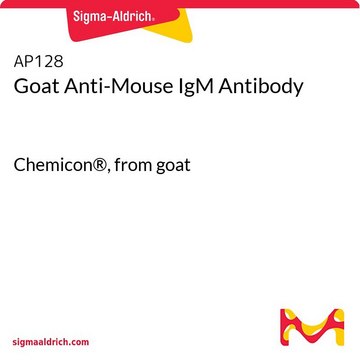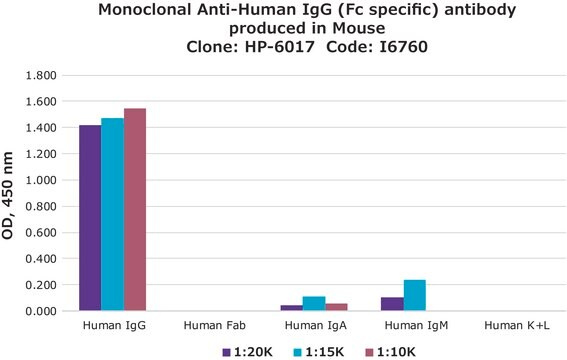AP127
Goat Anti-Mouse IgG Antibody, Fc
2.4 mg/mL, Chemicon®
Autenticatiper visualizzare i prezzi riservati alla tua organizzazione & contrattuali
About This Item
Codice UNSPSC:
12352203
eCl@ss:
32160702
NACRES:
NA.46
Prodotti consigliati
Origine biologica
goat
Livello qualitativo
Coniugato
unconjugated
Forma dell’anticorpo
affinity purified immunoglobulin
Clone
polyclonal
Reattività contro le specie
mouse
Produttore/marchio commerciale
Chemicon®
Concentrazione
2.4 mg/mL
tecniche
ELISA: suitable
immunoprecipitation (IP): suitable
western blot: suitable
Condizioni di spedizione
wet ice
modifica post-traduzionali bersaglio
unmodified
Descrizione generale
Immunoglobulin G (IgG), is one of the most abundant proteins in human serum with normal levels between 8-17 mg/mL in adult blood. IgG is important for our defence against microorganisms and the molecules are produced by B lymphocytes as a part of our adaptive immune response. The IgG molecule has two separate functions; to bind to the pathogen that elicited the response and to recruit other cells and molecules to destroy the antigen. The variability of the IgG pool is generated by somatic recombination and the number of specificities in an individual at a given time point is estimated to be 1011 variants.
Applicazioni
Detect Mouse IgG using this Goat anti-Mouse IgG Antibody, Fc validated for use in ELISA, IP & WB.
Stato fisico
Affinity purified immunoglobulin. Liquid. Buffer = 0.01% Sodium Phosphate, 0.25 M NaCl, pH 7.6
Stoccaggio e stabilità
Store at +2-8°C in undiluted aliquots for up to six months, sterile conditions.
Note legali
CHEMICON is a registered trademark of Merck KGaA, Darmstadt, Germany
Codice della classe di stoccaggio
12 - Non Combustible Liquids
Classe di pericolosità dell'acqua (WGK)
WGK 2
Punto d’infiammabilità (°F)
Not applicable
Punto d’infiammabilità (°C)
Not applicable
Certificati d'analisi (COA)
Cerca il Certificati d'analisi (COA) digitando il numero di lotto/batch corrispondente. I numeri di lotto o di batch sono stampati sull'etichetta dei prodotti dopo la parola ‘Lotto’ o ‘Batch’.
Possiedi già questo prodotto?
I documenti relativi ai prodotti acquistati recentemente sono disponibili nell’Archivio dei documenti.
Conformation-dependent high-affinity monoclonal antibodies to prion proteins.
Larry H Stanker,Ana V Serban,Elisa Cleveland,Robert Hnasko,Azucena Lemus,Jiri Safar et al.
Journal of immunology (Baltimore, Md. : 1950) (1950)
Different rates of glycolysis affect glycolytic activities and protein properties in turkey breast muscle.
S Eadmusik,C Molette,H Remignon,X Fernandez
Animal : An International Journal of Animal Bioscience null
Larry H Stanker et al.
Toxins, 5(11), 2212-2226 (2013-11-21)
Botulism is a serious foodborne neuroparalytic disease, caused by botulinum neurotoxin (BoNT), produced by the anaerobic bacterium Clostridium botulinum. Seven toxin serotypes (A-H) have been described. The majority of human cases of botulism are caused by serotypes A and B
Miles C Scotcher et al.
PloS one, 5(6), e11047-e11047 (2010-06-16)
Botulinum neurotoxin (BoNT), the causative agent of botulism, a serious neuroparylatic disease, is produced by the anaerobic bacterium Clostridium botulinum and consists of a family of seven serotypes (A-H). We previously reported production of high-affinity monoclonal antibodies to BoNT serotype
Il team dei nostri ricercatori vanta grande esperienza in tutte le aree della ricerca quali Life Science, scienza dei materiali, sintesi chimica, cromatografia, discipline analitiche, ecc..
Contatta l'Assistenza Tecnica.








